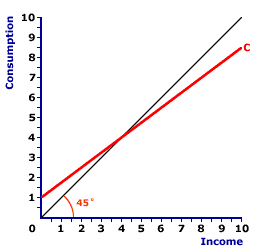
|
|
DEMAND: The willingness and ability to buy a range of quantities of a good at a range of prices, during a given time period. Demand is one half of the market exchange process; the other is supply. This demand side of the market draws inspiration from the unlimited wants and needs dimension of the scarcity problem. People desire the goods and services that satisfy our wants and needs. This is the ultimate source of demand.
Visit the GLOSS*arama
|
|


|

|
                           SLOPE, CONSUMPTION LINE: The positive slope of the consumption line is also termed the marginal propensity to consume (MPC). This slope is greater than zero but less than one, reflecting induced consumption and the Keynesian psychological law of consumer behavior that consumption increases by less than the increase in income. The slope of the consumption line provides the foundation for the slope of the aggregate expenditures line and thus also affects the magnitude of the multiplier process. | Consumption Line | 
|
The consumption line, also termed propensity-to-consume line or consumption function, shows the relation between consumption expenditures and income for the household sector. The income measure commonly used is national income or disposable income. Occasionally a measure of aggregate production, such as gross domestic product, is used instead.A representative consumption line is presented in the exhibit to the right. This red line, labeled C in the exhibit, is positively sloped, indicating that greater levels of income generate greater consumption expenditures by the household sector. This positive relation corresponds to the fundamental psychological law of Keynesian economics. The consumption line graphically illustrates the consumption-income relation for the household sector, which is the foundation of the aggregate expenditures line used in Keynesian economics to identify equilibrium income and production. For reference, a black 45-degree line is also presented in this exhibit. Because this line has a slope of one, it indicates the relative slope of the consumption line. The slope of the consumption line presented here is positive, but less than one. In fact, the slope of the consumption line is numerically equal to the marginal propensity to consume. In this case the slope is equal to 0.75. The positive slope reflects induced consumption expenditures--more income means more consumption. It also reflects the basic Keynesian psychological law. Click the [Slope] button to illustrate. To illustrate the equality between slope and the marginal propensity to consume, consider the equations for each. The slope of the consumption line is specified as the "rise" over the "run." The rise is the change in consumption measured on the vertical axis and the run is the change in income measured on the horizontal axis. | slope | = | rise
run | = | change in consumption
change in income |
The marginal propensity to consume (MPC) is the incremental change in consumption resulting from an incremental change in income. | MPC | = | change in consumption
change in income |
The slope of the consumption line is the marginal propensity to consume, they are one and the same.The positive slope of the consumption line reflects induced consumption, which is consumption that depends on the level of household sector income. If the household sector receives more income, then it is induced to undertake additional consumption expenditures. Of course, a drop in income induces the household sector to reduce expenditures.

Recommended Citation:SLOPE, CONSUMPTION LINE, AmosWEB Encyclonomic WEB*pedia, http://www.AmosWEB.com, AmosWEB LLC, 2000-2025. [Accessed: July 18, 2025].
Check Out These Related Terms... | | | | | | | | | | | | | | |
Or For A Little Background... | | | | | | | | | |
And For Further Study... | | | | | | | | | | | | | | |
Search Again?
Back to the WEB*pedia
|



|

|
RED AGGRESSERINE
[What's This?]
Today, you are likely to spend a great deal of time at a flea market wanting to buy either a weathervane with a cow on top or a box of multi-colored, plastic paper clips. Be on the lookout for telephone calls from long-lost relatives.
Your Complete Scope
This isn't me! What am I?
|

|
|
The first paper notes printed in the United States were in denominations of 1 cent, 5 cents, 25 cents, and 50 cents.
|

|
|
"A winner is someone who recognizes his God-given talents, works his tail off to develop them into skills, and uses those skills to accomplish his goals. " -- Larry Bird, basketball player
|

|
CPI-U
Consumer Price Index-All Urban Consumers
|

|
|
Tell us what you think about AmosWEB. Like what you see? Have suggestions for improvements? Let us know. Click the User Feedback link.
User Feedback
|


|


